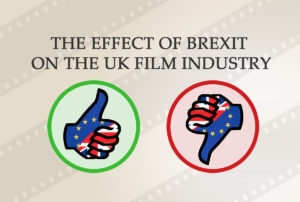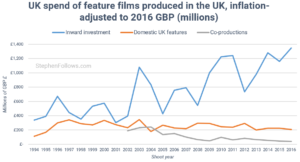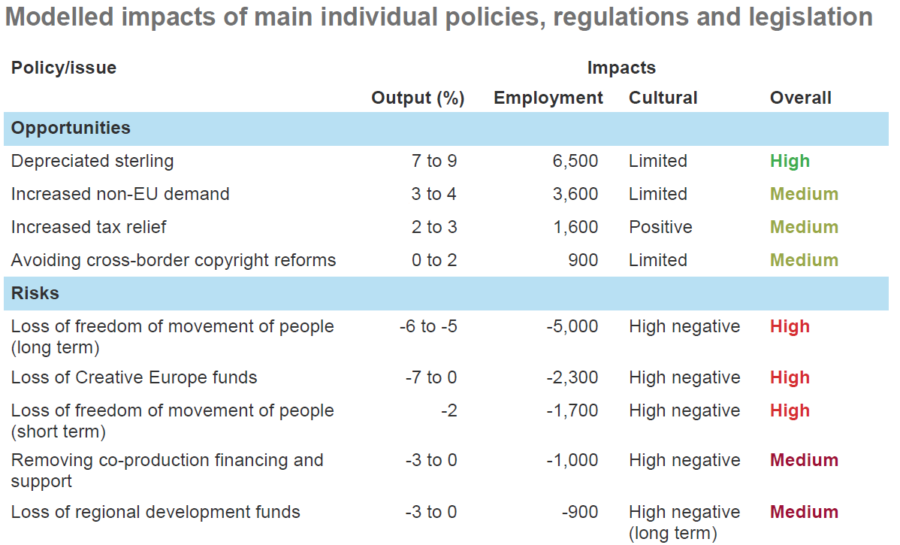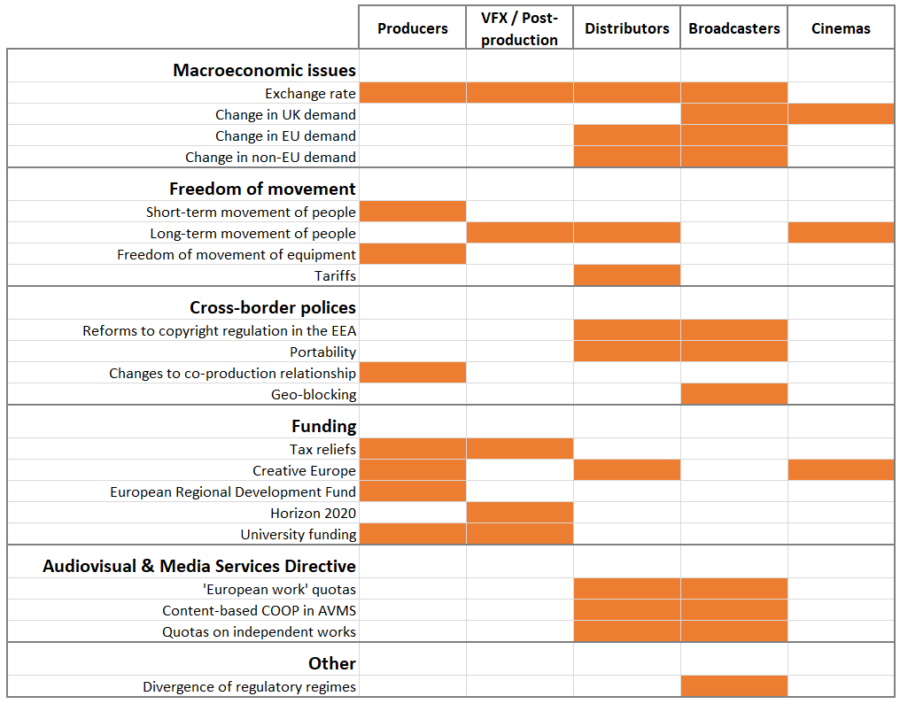 It’s been almost a year since I last addressed the topic of Brexit on this blog and I’ve wanted to give you an update for a while. The reason you’re reading this now is that the BFI have finally released an internal report (commissioned last summer) which looks at the effect of Brexit on the UK’s screen sector.
It’s been almost a year since I last addressed the topic of Brexit on this blog and I’ve wanted to give you an update for a while. The reason you’re reading this now is that the BFI have finally released an internal report (commissioned last summer) which looks at the effect of Brexit on the UK’s screen sector.
The report was put out to tender last August and the finished document delivered to the BFI’s Screen Sector Task Force in January. It wasn’t publicly available, so I put in a Freedom of Information request and last Friday the report was added to the BFI site. I strongly recommend that you download and read the full report yourself. It’s 84 pages long and it goes into much more detail on the topic.
Today’s article was also informed by a House of Lords report, by my own research and by a panel I recently chaired at the Royal Institution. My guests were Rebecca O’Brien (producer of Ken Loach’s films), Nick Toon (vice president of UK public policy at Time Warner) and Nicola Countouris (professor of law at UCL). With such a distinguished panel, we were able to cover some of the most pressing aspects of the Brexit process.
Disclaimer: We’re even more clueless than usual
 The film industry is always keen to quote William Goldman’s famous phrase that “Nobody knows anything” and this has never been truer than when we’re discussing how Brexit could affect the film industry.
The film industry is always keen to quote William Goldman’s famous phrase that “Nobody knows anything” and this has never been truer than when we’re discussing how Brexit could affect the film industry.
As I type this, representatives from the UK government are starting to negotiate with EU officials about the terms of Britain’s exit from the EU. After that, the UK will need to negotiate new trading terms and then finally we’ll need to wait and see how the film industry adapts to the new conditions. All in all, there are a huge number of very important unknowns.
Despite this high level of uncertainty, there is still merit in discussing Brexit at this early stage. As an industry, we need to know what to lobby and fight for during the negotiations, plus we should be planning for the challenges we may face in the post-Brexit years.
I’m going to summarise four positive and four negative likely effects of Brexit, based on what we know today.
Let’s start with the positive effects:
 The weaker pound means that foreign studios and producers get better value when spending in the UK.
The weaker pound means that foreign studios and producers get better value when spending in the UK.
 The biggest winners here are the Hollywood studios, who have already been ramping up their UK production over the past decade. Fifteen years ago, ‘inward investment’ (i.e. film finance from non-UK sources) accounted for under half of the amount spent on UK films, whereas in 2016 it reached 85%.
The biggest winners here are the Hollywood studios, who have already been ramping up their UK production over the past decade. Fifteen years ago, ‘inward investment’ (i.e. film finance from non-UK sources) accounted for under half of the amount spent on UK films, whereas in 2016 it reached 85%.
This means that the biggest short-term effect of Brexit (i.e. the falling pound) has already helped the people supplying 85% of the money spent on productions in the UK. This will hopefully lead to an increasing number of productions reaching our shores, meaning more people will be employed, possibly driving up wages and growing the size of the UK film economy.
Obviously, there is a concern here that this would mean that our industry would be much more vulnerable to currency shifts, something which is completely out of our control. Ironically, if Brexit proves to be a boom for the whole UK economy then we would find that this currency advantage slips away. In short, the UK film industry is the Dorian Gray of the UK!
Further reading: How much of the UK film economy comes from abroad?
 The UK will be free to negotiate new free trade deals with other countries
The UK will be free to negotiate new free trade deals with other countries
EU countries are bound together and agree to trade deals as one block. While this gives them strength and added power, it also can make the process slower and not tailored to the needs of one country. Post-Brexit, the UK could be free to carve out deals with only its own self-interest as its negotiating focus.
This could be a double-edged sword, as other nations may demand restrictions on aspects of UK films in future trade deals. For example, the UK’s Film Tax Relief is proving very successful in luring big productions away from the US, so it’s possible that US unions may lobby lawmakers to reduce the power of the FTR to protect US jobs.
Further reading: Where in the world do British films do well?
 Make the Film Tax Relief simpler and more focused
Make the Film Tax Relief simpler and more focused
 EU rules on state aid have had a big effect on the UK’s Film Tax Relief (FTR). In order to apply for the 20% rebate, films are required to pass a Cultural Test which awards points for various aspects of the production. Initially, the test used phrases such as “UK”, “British” and “English” when dictating what types of cast, crew, languages and characters would be rewarded. The EU stepped in, requiring that all such words be replaced by the phrase “EEA” in order to treat all EU countries and the three non-EU members of the European Economic Area (Iceland, Liechtenstein and Norway) equally.
EU rules on state aid have had a big effect on the UK’s Film Tax Relief (FTR). In order to apply for the 20% rebate, films are required to pass a Cultural Test which awards points for various aspects of the production. Initially, the test used phrases such as “UK”, “British” and “English” when dictating what types of cast, crew, languages and characters would be rewarded. The EU stepped in, requiring that all such words be replaced by the phrase “EEA” in order to treat all EU countries and the three non-EU members of the European Economic Area (Iceland, Liechtenstein and Norway) equally.
In a post-Brexit world, the UK can reverse this change, as well as having autonomy to simplify other aspects of the FTR. For example, state aid schemes in the EU are forbidden from applying to more than 80% of the expenditure involved (in this case, 80% of the money spent on a film). So when the UK government wants to provide filmmakers with a 20% rebate, it has to phrase it as “25% of 80% of expenditure”.
Further reading: How much has the UK government paid in film tax breaks?
 Avoid EU regulations on cross-border copyright
Avoid EU regulations on cross-border copyright
The EU is currently proposing a big change in how digital copyright operates within its borders. Currently, companies such as Netflix and iTunes can sell you a movie, song or game in one country and prevent you from accessing it when you’re abroad. The proposed Single Digital Market would prevent companies from enacting location-specific restrictions within EU states, forcing them to treat the EU as one single territory. Whilst this is advantageous to consumers, it could have a very harmful effect on producers and distributors of independent content.
Brexit will mean that the UK is somewhat shielded from the worst effects of the Single Digital Market. UK content sold in the EU will still be affected, but no more so than that of content from any other nation.
Further reading: European Film Industry Reacts to Digital Single Market Proposals
 Loss of freedom of movement within the labour market
Loss of freedom of movement within the labour market
 Probably the biggest worry the UK film industry has post-Brexit is the possible restriction on the movement of people. The freedom to be able to hire EU nationals on the same basis as UK workers has been very advantageous to productions shooting and completing in the UK. The post-production and visual effects sectors will likely be particularly badly hit, as they require freelancers with very specific skills.
Probably the biggest worry the UK film industry has post-Brexit is the possible restriction on the movement of people. The freedom to be able to hire EU nationals on the same basis as UK workers has been very advantageous to productions shooting and completing in the UK. The post-production and visual effects sectors will likely be particularly badly hit, as they require freelancers with very specific skills.
Restrictions on EU nationals will also affect the film industry in other ways, such as reducing the demand for UK-based training courses (resulting in fewer trained staff who are familiar with how the UK film industry functions) and reducing the ability of EU producers to shoot freely in the UK (thereby reducing demand for employment and services within the UK).
Further reading: How many people does it take to make a film in the UK?
 Loss of the money and support from Creative Europe
Loss of the money and support from Creative Europe
Creative Europe (formally called MEDIA), provided over €100 million towards various aspects of the UK film industry in the seven years between 2007 and 2013. This spans training, development, co-productions, festivals and theatrical distribution (both EU films in UK cinemas and UK films in EU cinemas).
It’s possible for the UK to re-join Creative Europe after Brexit but this will require a new framework to be negotiated and agreed. If the UK leaves Creative Europe without replacing the money and support it provides, then it’s an almost certainty that jobs will be lost and productions will not be funded, mostly in the independent sector.
Further reading: How much has the MEDIA budget benefitted the UK film industry?
 Loss of support and training funds
Loss of support and training funds
 The EU has a number of training and support funds which benefit the UK film industry, including the European Regional Development Fund (ERDF), which supports projects and activities which aim to reduce the economic disparity between member states, and the European Social Fund (ESF) which supports employment-based programmes. Examples of film-related schemes that have benefited from this kind of EU money include the Advantage West Midlands Production Fund (£5.6 million), Greater Manchester ProConnect (£352k) and Hertfordshire ProConnect (£500k).
The EU has a number of training and support funds which benefit the UK film industry, including the European Regional Development Fund (ERDF), which supports projects and activities which aim to reduce the economic disparity between member states, and the European Social Fund (ESF) which supports employment-based programmes. Examples of film-related schemes that have benefited from this kind of EU money include the Advantage West Midlands Production Fund (£5.6 million), Greater Manchester ProConnect (£352k) and Hertfordshire ProConnect (£500k).
Also lost would be funding via the EU’s Horizon 2020 programme, which funds research in educational institutions and in the private sector. This would most likely affect the visual effects sector hardest, due to their need to develop new and innovative techniques to stay competitive.
Further reading: The impacts of leaving the EU on the UK’s screen sector
 Removal of co-production financing and support
Removal of co-production financing and support
Many British independent films take advantage of co-production arrangements, whereby a film can benefit from government schemes in multiple countries, such as the FTR in the UK. These co-production deals are a product of the European Convention on Cinematic Co-Production (ECCC). The ECCC is an instrument of the Council of Europe, not the EU, and so on the face of it, Brexit won’t affect official co-productions. However, there are a couple of possible post-Brexit negative effects. Firstly, ECCC signatories must “facilitate entry and residence of crew and talent” and so if a post-Brexit Britain did not live up to these requirements then co-productions could be at risk. Secondly, even if the co-production facility exists, there still need to be willing parties in both countries. The added restrictions placed upon a deal between an EU and non-EU nation may harm the likelihood of co-production deals.
Further reading: A guide to co-producing with the UK
Where Brexit will bite hardest
For brevity’s sake, I have presented four positive and four negative aspects to Brexit. However, this does not mean that the overall effect will be neutral. The authors of the BFI report have modelled the likely effect of Brexit on the UK’s screen industries. Below is a condensed summary of their conclusions:
In the table below, Output refers to a proportional change in the volume of screen sector content made in the UK annually, Employment refers to the number of jobs gained or lost and Cultural impacts are summarised in terms of the magnitude of the overall impact.

The authors also broke down which sectors of the industry will be affected by changes to particular policies. The table below summarises which individual policies and legislation at issue during Brexit affect each sector:

Soon after the Brexit vote last summer, I conducted a survey of 156 film professionals. You can read the full results here but the headline is that 68% said they were “strongly against” Brexit, 14% were “mildly against”, 2% were “mildly for”, 3% were “strongly for” and 13% were either undecided or didn’t feel they had enough information to express a view.
This negative view of Brexit is shared by the authors of the BFI report, who say:
We conclude that most of the exit scenarios result in net adverse impacts on the UK’s screen sector. There are exit scenarios whereby the UK’s screen sector could benefit from exit from the EU, albeit this is predicated on a set of arrangements that seem unlikely given the current state of the negotiations. Specifically, such arrangements would require the UK to negotiate to opt into legislative and policy arrangements that are beneficial to the UK’s screen sector (such as the AVMSD and Creative Europe) and to opt out of those that are harmful (such as the cross-border copyright reforms). The arrangements would also involve the UK government accepting freedom of movement of people. Given the current nature of the negotiations with the EU, the UK is unlikely to be able to make such a deal
It’s worth noting that the exact effect of Brexit will depend heavily on the terms the UK agrees with the EU. These are obviously unknown at the moment, although recent news suggests they may not be as “soft” as the UK film industry is hoping for.
Notes
 Here are a few notes and clarifications on today’s article:
Here are a few notes and clarifications on today’s article:
- The BFI report claims that its contents are copyrighted to the report’s author, Oxera. This is highly unlikely to be true as the terms of the initial BFI tender included the assignment of all intellectual copyright to the BFI. I only mention this as I would hate for interested students, teachers and filmmakers to feel as though they were restricted in sharing and discussing its contents, due to the erroneous copyright claim.
- I have no personal link to the BFI report. I had agreed to advise a few of the teams who bid for the tender, but not the winning party. As my advice would only have been needed had they won the contract, I didn’t get involved in either the tender process nor the final report.
- If you’re interested in the economics of reports like this, the BFI tender allowed parties to bid up to £70,000 to complete the work.
- As my blog is focused on the film industry, I have not addressed some of the possible impacts of Brexit on other screen industries (i.e television, video games and animation programming). For example, the BFI report highlights the possible negative impact on the UK TV industry as “losing the ability to broadcast channels from the UK to the rest of the EU” and points out the effect of forthcoming EU data protection rules on the games industry.
- There are possible effects not mentioned in today’s main article, such as the possibility that UK content will lose its ‘European’ destination under the Audiovisual Media Services Directive. The AVMSD requires that European broadcasters give a majority of its transmission time for ‘European works’. Currently, this only applied to traditional channel and platforms, but there are suggestions that it will soon extend to online platforms. The reason I left this off the main list is that it will be heavily affected by the type of Brexit we have. Even after Brexit, the UK could theoretically remain a signatory of the European Convention on Transfrontier Television, which is where the official designation of a ‘European work’ derives.
Epilogue
As always, I have avoided giving my own opinion or trying to predict what will happen. But there’s no need for you, dear reader, to abstain. Add your (polite and considerate) thoughts and opinions in the comments section below.





Comments
I think it is in the development of skills and UK films where we will be hit hardest. The foreign spending to use our great studio space and amazing crews is obviously a welcome boost after it looked sketchy a few years ago, but we can’t rely on that alone going forward. Tories and Labour put too much focus on the financial sector to underpin the UK economy to the detriment of manufacturing and look where that got us. Lessons need to be learned. Fine article, Matt